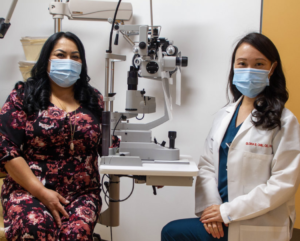(Originally posted at USC Roski Eye Institute.)
Three years ago, an outside clinic diagnosed Maria Contreras with keratoconus, a degenerative eye disease that causes thinning and bulging of the cornea. Though the clinic followed her for years, Maria saw no improvement in her vision and continued to suffer from poorly corrected irregular astigmatism, a lack of depth perception, and significantly decreased vision in both eyes. Her deteriorating vision was affecting her daily activities, especially at night. She was even told by her doctor that she might have to give up her driver’s license.
“Eventually, I knew their treatment wasn’t working and I needed to do my own research,” Maria said. “There had to be other options for me.”
A friend, who’d received treatment for a similar condition at the USC Roski Eye Institute, recommended that Maria schedule a consultation with Dr. Gloria Chiu. Dr. Chiu is an optometrist who focuses on prescribing specialty contact lenses for various eye conditions, including keratoconus. Although the prevalence of the eye disease ranges from about 1-4% globally, a high volume of patients who seek care and treatment from Dr. Chiu have this condition.
With Maria’s diagnosis established, Dr. Chiu learned that Maria had only been prescribed glasses to correct her vision. “This surprised me because for many keratoconus patients, glasses don’t work adequately once the condition becomes more advanced and the eye shape has become distorted,” said Dr. Chiu. “This is when specialty contact lenses or scleral lenses are required to best correct the vision.”
Dr. Chiu at first fitted Maria with rigid gas permeable (RGP) contacts, and although Maria’s vision improved, she remarked that the bulky lenses were uncomfortable. “I felt like I had an eyelash stuck in my eye,” Maria recalled.
Dr. Chiu then presented Maria with another option, PROSE treatment. PROSE (or: Prosthetic Replacement of the Ocular Surface Ecosystem) utilizes a special software program to create scleral devices that are customized to match the unique contour of a patient’s eye.
“The moment I put them on, I started to cry,” Maria said. “I knew this was something amazing.”
Although PROSE offered a way to improve her vision, Maria faced another hurdle: her insurance would not cover the scleral devices. Fortunately, Dr. Chiu offered a new solution. In 2011, a former grateful patient of hers helped to establish the PROSE Care Fund, which was created to provide financial assistance for PROSE treatment to low income patients or to those whose insurance denied coverage.
Within weeks of submitting her application for assistance, Maria was approved and fitted with her custom PROSE lenses. “It has been a month now and I am able to drive comfortably and travel outside. I see the colors, details of flowers, people’s faces, and how beautiful the world is. I cannot express how grateful I am.”
Dr. Chiu will continue to monitor and treat Maria’s eyes to ensure that the keratoconus does not progress or worsen. Although advanced keratoconus is currently a degenerative eye disease that cannot be reversed, the PROSE lenses have given Maria her life and sight back.
Learn more about Keratoconus at the National Keratoconus Foundation: NKCF.org
Do you know someone with an eye condition similar to Maria’s? If so, please reach out to us at 323-442-6335 or contact us to schedule a consultation today.
